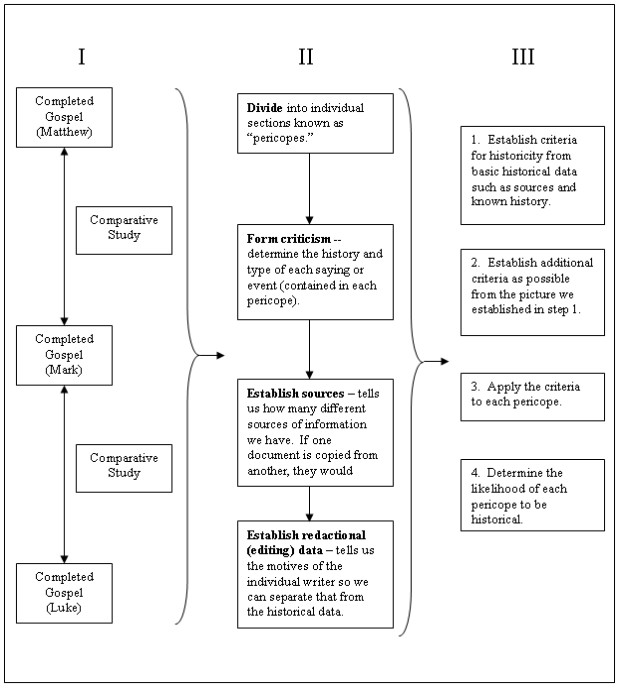
| ||
|
Book Catalog Tracts Catalog Retail Store Bible Resource Store Energion Publications |
||
Participatory Study Series Pamphlets
Understanding the Search for the Historical Jesus
|
|
Other formatsUnderstanding the Search for the Historical Jesus is available in PDF format and Word document format. You can find our permission to print these pamphlets at the Participatory Study Series index.
|
The mind of an understanding person seeks knowledge. - Proverbs 15:14

What is the purpose of this pamphlet?
This pamphlet is designed to help you understand what you read in various books on the search for the historical Jesus. Often authors make assumptions about what readers will already know, or present the results of critical Biblical scholarship as established fact without giving the readers an adequate opportunity to evaluate this information. The pamphlet is not intended to support any particular point of view on the search.
While I make use of historical-critical methodology, I believe that readers should be aware of the methods used and have an opportunity to evaluate and decide how they view the validity of such information.
Why is there a search for the historical Jesus? Don't we already know who Jesus was?
The search for the historical Jesus results from the fact that we have four different canonical gospels, numerous non-canonical gospels, and that they do not agree in an obvious way on all the events, and especially on the details of the life and teaching of Jesus.
There are two nearly opposite approaches to producing a composite picture of who Jesus was based on the information available. The first is harmonization, the second is a division and study based on historical criteria.
Harmonization in its most extreme form takes all information in the gospels as absolutely historical in all details and tries to construct a single whole on the assumption that there will be no difficulties if we just can find all of the facts.
The approach of historical criteria assumes that any single claim that Jesus said something or any single action or event may be historical or not, and that a decision must be made based on the number and quality of the sources which support it, and basic historical criteria.
The majority of scholars do not follow either extreme. For example, many, even of those who are conservative, allow for some differences in witness reporting and in various details. As a result of applying historical criteria, many harmonizations may qualify as historical as well.
What are non-canonical gospels? What is their role in the search for the historical Jesus?
A critical issue in how one goes about the search for the historical Jesus is the use of non-canonical gospels. There are quite a number of these in various states of preservation. Some scholars take each pericope strictly on the basis of historical criteria. Others privilege the information found in certain gospels over the information found in others. Many conservative Christians privilege the information found in the canonical gospels. Some in the Jesus Seminar have tended to give an advantage to the gospel of Thomas because they believe it should be dated very early. In reading a book about the historical Jesus, one needs to find out what the assumptions of the author actually are.
What does the search for the historical Jesus have to do with my faith in Jesus?
How the search relates to your faith depends on how your faith is founded. Christianity combines two elements: historical facts and present experience. Each of us has a different focus on these elements and how they relate to our faith. For many people, the details are not important, but key events in the life of Jesus are definitely important. Such events are the birth, crucifixion and resurrection.
For those who are concerned that every detail of every event, such as how many times the cock crowed at the time of the crucifixion, the search itself is threatening. For those who are concerned with major events, only the questions about these key points are critical to faith.
Because of these differences in perspective, and because there are scholars who hold just about any imaginable opinion about the life of Jesus, and who will proclaim these positions as the result of scholarship, it is important for you to understand how scholars reach these conclusions so you can decide just how important their research is to you.
One key way to keep from being swayed by just any view is to read a selection of views so you will see the arguments both for and against. At the end of this pamphlet is a link to the Energion web site where there is a list of key books for some of the major views on historical Jesus research.
What are some examples of historical criteria that would be used in determining the historicity of any particular pericope?
Criteria fall generally into three categories: documentation, historical criteria, and criteria derived from an understanding of a picture of Jesus.
1. Documentation. Scholars ask how many independent sources contain the story of the event or saying.
2. Historical criteria. Probably the most famous historical criterion is the criterion of embarrassment. If a story would embarrass the people who are preserving it, then it is probably true, and so well known that it could not be omitted. The story of the disciples abandoning Jesus at the crucifixion is such a story.
3. Derived criteria. One criterion that might be derived from such a picture would be that Jesus never directly answers a question or never offers to heal, but rather heals when he is asked. If one is then presented with a story in which Jesus directly answers a question or offers to heal someone, one might reject it based on this criterion.
Isn't the use of criteria to determine historicity somewhat circular?
The first two categories of criteria are not circular, though they may be based on our general understanding of the world, such as whether we believe that miracles or predictive prophecy are possible.
The third category is circular to a certain extent. Nonetheless it can be valuable in judging questionable sources, provided one has established these additional criteria based on a well selected set of sources.
Do all searchers for the historical Jesus deny the miraculous?
No. Historical researchers come from all different schools of thought and a variety of faith positions. For some examples of this kind of work see Tom Wright (conservative), John Dominic Crossan (liberal), The Jesus Seminar book The Five Gospels (liberal), or E. P. Sanders (moderate).
Further Resources:
Selected Bibliography for the Search for the Historical Jesus.
Energion Publications
P. O. Box 841
Gonzalez, FL 32560
Phone: (850) 525-3916
Web: Energion Publications (http://energion.com)
E-Mail: pubs@energion.com
This brochure is available in quantity. Contact Energion Publications for more information.
All scripture quotations taken from the Contemporary English Version, Copyright © 1995 American Bible Society.
Copyright © 2004, Henry E. Neufeld
Rev. 1.0


